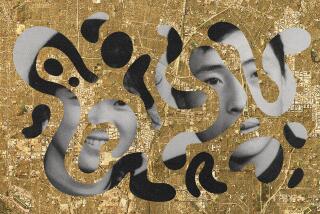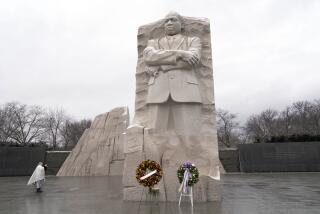Organizers of Kwanzaa Celebration Reach Out
- Share via
Jah-Anen Mobley and his two sons are pounding their drums, his wife a whirling blur in a rainbow garment. When the Orange County members of an African music ensemble are staging a performance, one Anaheim family is all the audience gets.
To celebrate the African American holiday of Kwanzaa in Orange County, where only 2% of the population is black, organizers have to work a little harder to get the point across. Aside from making do with a smaller-than-normal number of musicians, the organizers have to invite storytellers from other counties and purchase costumes and traditional paraphernalia in Leimert Park, a neighborhood at the heart of Los Angeles’ black community.
But the nearly 150 people who attended a Kwanzaa celebration Saturday at the Bowers Museum in Santa Ana were still enthralled as Mobley and his family danced, children lighted candles symbolizing the holiday’s seven principles, and narrators explained the holiday’s history.
The African Cultural Arts Council, a museum affiliate, has held the event for 10 years.
Kwanzaa, created in 1966 by a Cal State Long Beach professor, stretches from Dec. 26 to Jan. 1 and celebrates the connection between black Americans and African traditions.
The holiday is marked in Orange County at homes, in churches and elsewhere by other organizations. But none has the drawing power of the Bowers Museum event. The museum also honors Juneteenth and Martin Luther King Jr.’s birthday, and is for some African Americans in the county the closest thing they have to a cultural hub.
“We’re all so spread out around the county,” said Virginia Stovall, event chairwoman. “This is the only place where you’ll see this many black people together in Orange County, outside of church.”
When an elementary school teacher wandered through the crowd before the event, inquiring where she could buy a Kwanzaa candleholder in Orange County for a classroom display, Stovall and other event organizers were stumped. “Are you sure you can’t get up to L.A.?” Stovall asked. “Our community down here hasn’t gotten that far yet to have those kinds of stores.”
With a few dozen more attendees than last year, the event and other cultural celebrations show Orange County is embracing its black community more, said Mobley, who this month started organizing Sunday reggae events in Anaheim.
“We’re growing, strengthening our circle,” he said. “Since there aren’t a lot of us here, our emphasis is on getting people of all races and cultures interested in African traditions.”
Willia Edmonds, co-organizer of the event, said she wished more races were represented among attendees, more than three-fourths of whom were black.
“It would be nice to have more of a mix so it becomes less an us or a them thing,” she said.
“This event helps people cross cultural boundaries, removing the mystery behind the holiday.”
Andrea Rose, 27, of Whittier said Kwanzaa events are the only way she can teach her two sons the meaning of the holiday.
“My grandmother had told me Kwanzaa was about black people trying to separate and be their own power,” Rose said. “But I learned today that it’s about appreciating our culture and hoping others do the same.”
More to Read
Sign up for Essential California
The most important California stories and recommendations in your inbox every morning.
You may occasionally receive promotional content from the Los Angeles Times.













